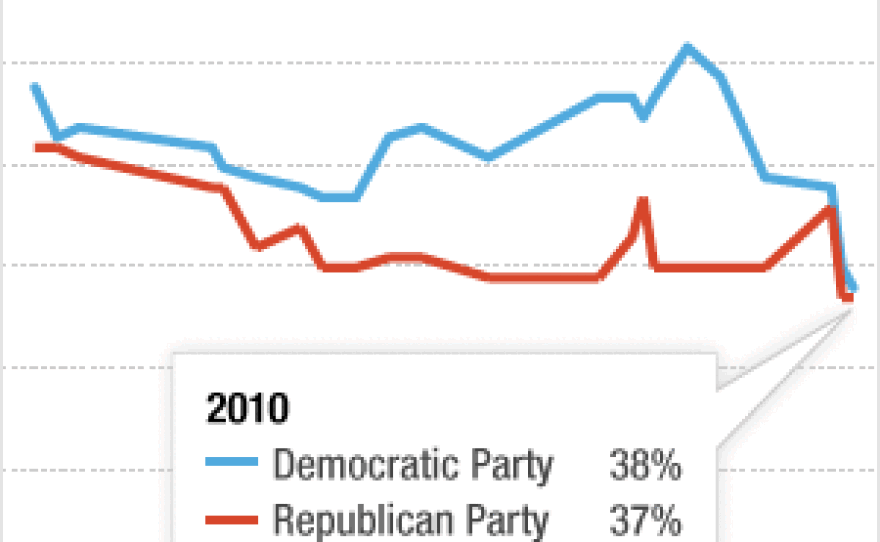For a Democratic administration that wants to do big things with government, the severe erosion of trust in government is a real problem -- and President Obama knows it.
"We have to recognize that we face more than a deficit of dollars right now," he said during this year's State of the Union address. "We face a deficit of trust -- deep and corrosive doubts about how Washington works that have been growing for years."
What the president calls a deficit of trust has been impossible for him to surmount -- and it's undermining support for him and his policies, says Andrew Kohut, the director of the Pew Research Center that just completed a big survey looking at Americans' growing distrust of government.
"No other factor loomed as large in preventing Americans from embracing the proposals of the Congress and Barack Obama than views about government," Kohut says. "A president who wants to use government to solve problems when a public says, 'We don't trust the government; we want less government,' is a problem."
Continued Loss Of Trust
In Kohut's poll, 84 percent of those opposed to the president's new health care law said the reason was too much government. In November 2008, 43 percent said they wanted a smaller government with fewer services. That number has now grown to 50 percent.

Bill Galston, who served in the Clinton White House when it was grappling with similar anger at big government, says the continued loss of trust in government over the past year is striking given the wave of trust -- at least personal trust -- that swept Obama into office.
"I think the president assumed ... that the confidence that the American people had invested in him as a leader would somehow spill over to his party and to the instruments of government as a whole," Galston says. "And if that's what he assumed, he was wrong from the start. The American people had not suspended their mistrust of government. For example, candidate Obama issued a large promissory note about an end to partisan bickering and a return to something closer to civility ... in the relations between the political parties."
And when Obama wasn't able to redeem that promise, attitudes toward government got even more negative. But the president's top strategist, David Axelrod, says that's not all Obama's fault. Axelrod accuses the Republicans of trying to de-legitimize government.
"In Chicago, there was an old tradition of throwing a brick through your own campaign office window, and then calling a press conference to say that you've been attacked," Axelrod says. "I think it's a little bit the same with the Republicans. They meet, they decide we're not going to give the president any bipartisan support, and then they call a press conference to accuse him of not governing in a bipartisan way. And that, I think, grates on people."
Not The President's Fault, But It Is His Problem
Kohut agrees that the current deficit of trust is due to a lot of factors.
"Trust in government declines when national conditions are bad," he says. "National conditions are bad; the economy is bad. So that's one factor. [The second] factor is that when there's a Democratic president, Republicans become much more mistrusting of government than do Democrats when there is a Republican president."
So the lack of trust in government may not be the president's fault, but it certainly is his problem. The people who tell surveyors they are angriest about the government also favor Republicans. And survey after survey has found that these angry voters are more likely to go to the polls in this November's midterm elections than are Democrats.
What can President Obama do about this? Axelrod says in the long run, the best thing is to solve the country's problems and convince the public the solutions are working.
"There is a fundamental sense of jaundice on the part of everyday people who feel like they're meeting their responsibilities, and all around them, they see irresponsibility," he says. "Well, the best way to deal with that is to behave responsibly, to govern responsibly, to be straightforward, to be transparent. That is the goal, and that is the standard by which we want to hold ourselves. It's hard to do, given the nature of politics and government, but that should be our North Star."
Obama himself is bothered by the amount of disdain for government among politicians and the press. He says he's been thinking about ways he might address this -- such as a series of presidential speeches.
Of course, the president's conservative critics would argue that Obama might be able to increase trust in government if his government weren't trying to do so much.
Copyright 2022 NPR. To see more, visit https://www.npr.org. 9(MDAzMjM2NDYzMDEyMzc1Njk5NjAxNzY3OQ001))







